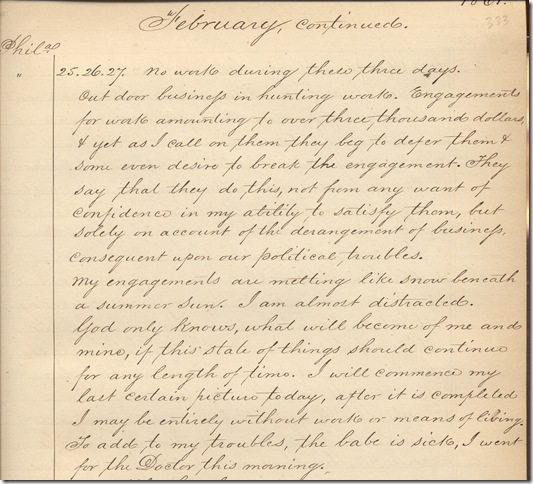John Henry Brown was a painter of portrait miniatures, living and working in Philadelphia. He had met Lincoln in August of 1860 when he was commissioned to paint Lincoln’s portrait for a supporter, but although Brown liked Lincoln personally, he did not agree with Republican policies.
Transcript:
No work during these three days.
Out door business in hunting work. Engagements for work amounting to over three thousand dollars, & yet as I call on them they beg to defer them & some even desire to break the engagement. They say that they do this not from any want of confidence in my ability to satisfy them, but solely on account of the derangement of business consequent upon our political troubles.
My engagements are melting like snow beneath a summer sun. I am almost distracted. God only knows, what will become of me and mine, if this state of things should continue for any length of time. I will commence my last certain picture today, after it is completed I may be entirely without work or means of living. To add to my troubles, the babe is sick, I went for the Doctor this morning.
Citation: John Henry Brown (1818-1891), autograph journal/account book. Philadelphia, 1844-1890. AMs 574/14.1

President Davis appoints three Confederate commissioners to attempt negotiations with the Federal government.
“After almost three weeks of deliberation, the Peace Convention adopted and sent to Congress six proposed constitutional amendments to restore sectional harmony. Its key territorial provision, to extend the Missouri Compromise line west to the Pacific Ocean, did not reflect a convincing consensus. It was initially rejected, but, on reconsideration, barely passed. Virginia, the key to the non-secessionist South, voted against the provision.
The package resembled the Crittenden Compromise in extending the Missouri Compromise line of 36 degrees, 30 minutes westward to the Pacific, and providing for the existence of slavery south of the line. The Peace C onvention resolutions were more favorable to the North, however. They made the future expansion of slavery unlikely by stipulating that new territories be acquired by treaties consented to by four-fifths of the Senate.
Presented to Congress just a few days before adjournment, the Peace Convention resolutions suffered the same negative fate as the Crittenden Compromise. On March 1, the House failed to muster the two-thirds vote necessary to bring the measure before it. The Senate, which considered the resolutions in the waning moments of its session on March 4, rejected them decisively, 28-7.” From http://www.tulane.edu/~latner/Dilemmas/DFeb27.html
Gov. Pickens of South Carolina writes President Davis that Ft. Sumter should be made southern property as soon as possible.
President Elect Lincoln has to deal with politicians seeking government jobs and pleas by Stephen Douglas for conciliation or compromise.